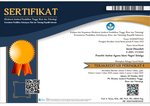Analisis Penerimaan Siswa terhadap Learning Management System (LMS) E-School dengan Model UTAUT di SMA Negeri 1 Boyolali
Abstract
Keywords
Full Text:
PDFReferences
Abbad, M. M. M. (2021). Using the UTAUT model to understand students usage of e-learning systems in developing countries. Education and Information Technologies, 26(6), 72057224. https://doi.org/10.1007/s10639-021-10573-5.
Ahmed, R. R., treimikien?, D., & treimikis, J. (2021). The extended UTAUT model and learning management system during covid-19: Evidence from PLS-SEM and conditional process modeling. Journal of Business Economics and Management, 23(1), 82104. https://doi.org/10.3846/jbem.2021.15664
Al-Mamary, Y. H. S. (2022a). Understanding the use of learning management systems by undergraduate university students using the UTAUT model: Credible evidence from Saudi Arabia. International Journal of Information Management Data Insights, 2(2), 100092. https://doi.org/10.1016/j.jjimei.2022.100092
Alharbi, A., Aljojo, N., Zainol, A., Alshutayri, A., Alharbi, B., Aldhahri,E., Khairullah, E. F., Almandeel, S., Arabia, S., & Journal, I. (2021). Identification of critical factors affecting the students acceptance of learning management system (LMS) in Saudi Arabia. International Journal of Innovation, 9(June), 353388.
Almaiah, M. A., Alamri, M. M., & Al-Rahmi, W. (2019). Applying the UTAUT model to explain the students acceptance of mobile learning system in higher education. IEEE Access, 7, 174673174686. https://doi.org/10.1109/ACCESS.2019.2957206
Alshehri, A., Rutter, M., & Smith, S. (2020). The moderating effects of experience and training on students use of a learning management system. International Journal of Information and Education Technology, 10(9), 685693. https://doi.org/10.18178/ijiet.2020.10.9.1444
Alturki, U., & Aldraiweesh, A. (2021). Application of learning management system (LMS) during the Covid-19 pandemic: A sustainable acceptance model of the expansion technology approach. Sustainability (Switzerland), 13(19). https://doi.org/10.3390/su131910991
Daud Mahande, R., & Jasruddin. (2017). UTAUT model: Suatu pendekatan evaluasi penerimaan e-learning pada program pascasarjana. Prosiding Seminar Nasional Membangun Indonesia Melalui Hasil Riset, 784788.
Elsha, N., Atikah, S., & Lenap, I. P. (2022). Pembelajaran akuntansi secara online: Pengujian model unified theory of acceptance dan use of technology (UTAUT). Balance : Jurnal Akuntansi Dan Manajemen, 1(3), 292300. https://doi.org/10.59086/jam.v1i3.171
Ghozali, I., & Latan, H. (2015). Partial Least Squares: Konsep, Teknik, dan Aplikasi Menggunakan Program SmartPLS 3.0 Untuk Penelitian Empiris. Badan Penerbit Universitas Diponegoro.
Handayani, T., & Sudiana. (2015). Analisis penerapan model UTAUT (unified theory of acceptance and use of technology) (Studi kasus : Sistem informasi akademik pada STTNAS Yogyakarta ). Jurnal Angkasa, VII(2), 165180.
Hwa, S. P., Hwei, O. S., & Peck, W. K. (2015). Perceived usefulness, perceived ease of use and behavioural intention to use a learning management system among students in a Malaysian University. International Journal of Conceptions on Management and Social Sciences, 3(4), 2935.
Ismail, I., Agus, F., & Rosmasari. (2021). Analisis penerimaan sistem e-learning menggunakan metode unified theory of acceptance and use of technology (UTAUT). Jurnal Rekayasa Teknologi Informasi (JURTI), 5(2), 199. https://doi.org/10.30872/jurti.v5i2.7071.
Marifatin, Q. I., Mursityo, Y. T., & Saputra, M. C. (2019). Analisis penerimaan pengguna e-learning Fakultas Ilmu Komputer menggunakan model unified theory of acceptance and use of technology (UTAUT) dan task technology fit (TTF). Jurnal Pengembangan Teknologi Informasi Dan Ilmu Komputer, 3(3), 24802489.
Nasir, M. (2013). Evaluasi penerimaan teknologi informasi mahasiswa di Palembang menggunakan model UTAUT. Seminar Nasional Aplikasi Teknologi Informasi (SNATI), 1(1), 152013.
Ratnasari, A., & Fakhrunnisa, R. (2021). Teknologi Pendidikan untuk mendukung pembelajaran di masa pandemi Covid-19. Journal Fascho in Education Conference-Proceedings, 2(1), 19.
Raza, S. A., Qazi, W., Khan, K. A., & Salam, J. (2021). Social isolation and acceptance of the learning management system (LMS) in the time of COVID-19 Pandemic: An expansion of the UTAUT Model. Journal of Educational Computing Research, 59(2), 183208. https://doi.org/10.1177/0735633120960421
Salloum, S. A., & Shalaan, K. (2018). Factors affecting students acceptance of e-learning system in higher education using UTAUT and structural equation modeling approaches. AISI 2018: Proceedings of the International Conference on Advanced Intelligent Systems and Informatics 2018, 469480.
Venkatesh, V., Morris, M. G., Davis, G. B., & Davis, F. D. (2003). User acceptance of information technology: Toward a unified view. MIS Quarterly, 28(4), 426478.
Yana, D., & Adam. (2019). Efektivitas penggunaan platform LMS sebagai media pembelajaran berbasis blended learning terhadap hasil belajar mahasiswa. DIMENSI, 8(1), 112.
Zwain, A. A. A. (2019). Technological innovativeness and information quality as neoteric predictors of users acceptance of learning management system. Interactive Technology and Smart Education, 16(3), 239254. https://doi.org/10.1108/ITSE-09-2018-0065.
DOI: https://doi.org/10.18326/dinamika.v4i2.96-113
Refbacks
- There are currently no refbacks.
Copyright (c) 2023 Siti Marfuah

This work is licensed under a Creative Commons Attribution-ShareAlike 4.0 International License.








